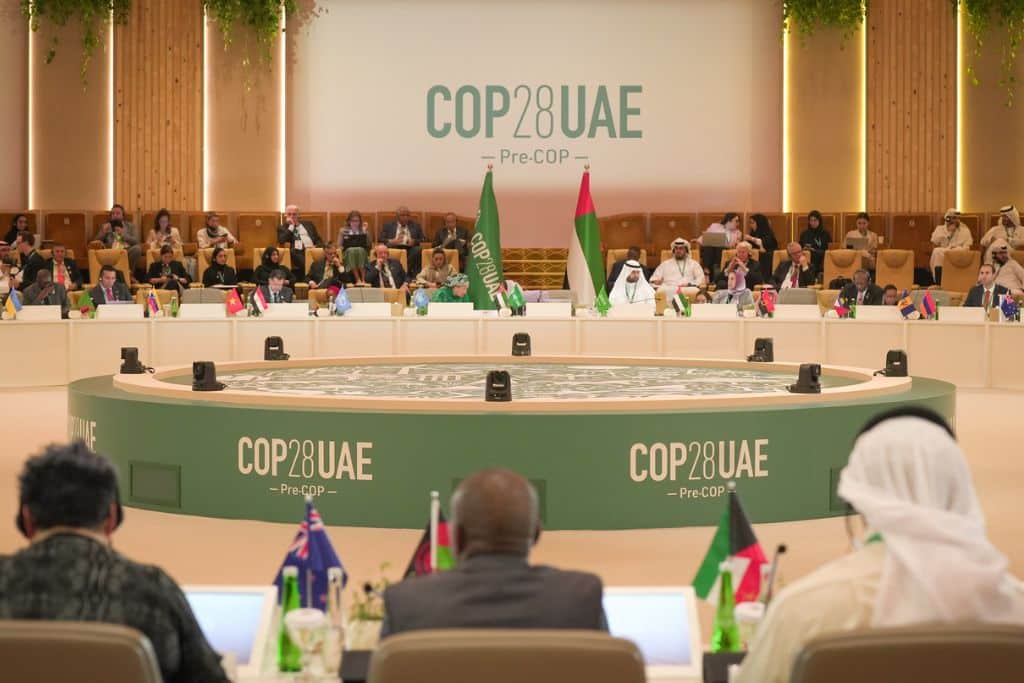Amidst mounting global concerns over climate change, the upcoming COP28 summit in Dubai emerges as a pivotal battleground for the world’s environmental future. With controversies swirling and urgent calls for action echoing across the globe, the conference’s agenda promises high-stakes negotiations and critical decisions that could shape the trajectory of international climate policy. From contentious leadership appointments to delayed climate funding, the stage is set for a showdown between divergent interests, underscoring the pressing need for equitable climate action and sustainable finance solutions.
—
Navigating Global Climate Action: The High-Stakes Dynamics of COP28 in Dubai
The United Nations Conference of the Parties, more commonly referred to as COP, is a crucial annual meeting where all states that are parties to the United Nations Framework Convention on Climate Change (UNFCCC) convene to review national strategies and emission inventories and assesses the progress of Parties in meeting the Convention’s objective to stabilise greenhouse gas concentrations in the atmosphere at a level that would prevent dangerous anthropogenic interference with the climate system, with the COP Presidency and session venues rotating among UN regions. This year, the conference will take place in Dubai in the United Arab Emirates (UAE), one of the world’s largest oil producers and a major OPEC exporter.
You might also like: Explainer: What Is the Kyoto Protocol?
Environmental activists are approaching COP28 with a sense of cautious anticipation. In the lead-up to the imminent conference, set to begin on November 30, controversies have already encircled the event, highlighting the challenges and tensions surrounding the effective implementation of climate policies and initiatives at the global level.
COP28 President’s Dual Roles Stir Controversy
The appointment of Sultan al-Jaber as the president of COP28 has sparked significant criticism and concerns over potential conflicts of interest. Al-Jaber is the CEO of the Abu Dhabi National Oil Company (ADNOC), the largest national drilling company in the Middle East by rig fleet size. The company plans to allocate a substantial $150 billion investment over the next five years, primarily focused on expanding its output. ADNOC currently produces 2.7 million barrels of oil daily but aims to increase this to five million barrels by 2027.
In addition to leading ADNOC, Al-Jaber is also the founder of Masdar, a clean energy firm that has allocated billions of dollars to zero-emissions energy technologies in over 40 nations. Masdar has concentrated its investments in solar and wind power projects, resulting in a combined capacity of 15 gigawatts, enough to offset over 19 million tonnes of carbon dioxide emissions annually. The company has set ambitious targets to expand its capacity to 100 gigawatts by 2030, with further plans to double this capacity in the future.
Amid resurgent global fossil fuel investment, Al-Jaber advocates for increased participation of fossil fuel companies in climate discussions and attributes the lack of progress in past climate summits to the contentious relationship between climate advocates and the fossil fuel industry. While some support his approach, many climate advocates and lawmakers criticise it, citing the fossil fuel industry’s historical resistance to climate action. In May 2023, a group of 133 US Senators and European Union lawmakers issued a joint statement to demand his replacement.
Emission Reduction Challenges
The COP28 presidency, along with two prominent renewable energy organisations, is urging governments to significantly amplify their efforts in the renewable energy sector.
According to a joint report published in October 2023 by the UAE presidency, the International Renewable Energy Agency (IRENA), and the Global Renewables Alliance, the goal is to triple global renewable energy capacity, aiming to surpass 11,000 GW by 2030. Although many major economies, including the Group of 20 (G20), have already committed to pursuing this goal, some, notably the EU and countries highly susceptible to the impacts of climate change, assert that an emphasis on clean energy expansion alone is insufficient without firm commitments to phase out fossil fuels.
A recent UN report underscores governments’ failure to rapidly reduce greenhouse gas emissions and the critical need to phase out all unabated fossil fuels. With a rapidly closing window to limit temperature rises to 1.5C, the report highlights a significant gap between necessary emissions cuts and the current trajectory.
“The problem is not simply fossil fuel emissions. It’s fossil fuels – period,” UN Secretary-General António Guterres said in June, adding that they are “incompatible with human survival.”
Guterres also attacked carbon capture technology, defined by the Intergovernmental Panel on Climate Change (IPCC) as “anthropogenic activities that remove carbon dioxide from the atmosphere and store it durably in geological, terrestrial, or ocean reservoirs, or in products.” He said that any attempt to justify the fossil fuel expansion with carbon capture and storage technologies only makes companies “more efficient planet wreckers.”
The only feasible solution, he argues, is to phase out fossil fuels completely and instead reinvest the industry’s massive profits in renewables and the green economy.
Despite previous promises to curb carbon emissions and support vulnerable nations, recent high-profile commitments have not materialised. This sluggish progress puts the planet on track to surpass critical temperature thresholds, resulting in intensified climate disasters. According to the aforementioned UN report, even with the fulfilment of current pledges, the Earth is still headed toward a perilous 2.4C temperature rise by the end of the century, significantly surpassing the 1.5C limit set by the Paris Agreement.
You might also like: ‘Staggering’ Clean Energy Growth Is Keeping Path to Limit Global Warming to 1.5C Open, IEA Chief Says
Countries’ Positions at COP28
Last month, the EU solidified its stance ahead of the UN’s COP28 climate conference. The bloc seeks an unprecedented global agreement to phase out unabated fossil fuel consumption, positioning itself as a vanguard in the fight against climate change. Nevertheless, there exists a divergence of opinions among EU Member States, with some nations advocating for a phase-out of all fossil fuels while others – including Italy – propose using carbon capture technology to mitigate emissions.
In their most recent meeting in New Delhi, G20 leaders – including the European Union – failed to address some of the most critical aspects of slowing down climate change, including setting a timeline to phase out planet-warming fossil fuels.
The 27-bloc also emphasises the necessity of discontinuing ineffective fossil fuel subsidies – which last year reached a total of US$7 trillion globally – and ceasing the construction of new coal-powered plants. While this standpoint has garnered support, it has also faced opposition, illustrating the ongoing global tension between nations apprehensive about the economic repercussions of reducing fossil fuel usage and those fervently championing urgent climate action.
Despite their professed good intentions and pledges, wealthy nations continue to steer in the opposite direction by providing substantial support to the fossil fuel industry. According to a recent report, G20 countries’ investments in the fossil fuel industry reached a record US$1.4 trillion last year, more than double the pre-pandemic and pre-energy crisis levels of 2019, a new report has found. Approximately three-quarters of all subsidies to the energy sector went to coal, oil, and gas. About $1 trillion worth of subsidies were aimed at consumers in a bid to protect them against the 2022 energy price crisis brought about by Russia’s invasion of Ukraine, which the authors blame for “catapult[ing] public financial support for fossil fuels to new levels.”
Calls for Equitable Climate Finance Amidst Delayed Funding
Developing nations continue facing the stark reality of delayed climate funding from major economies like the United States and China. Climate-fueled disasters are on the rise, with a recent UN report emphasising the urgent need for increased financing to combat global warming. Despite pledges made at the Copenhagen climate talks, many funding initiatives have encountered delays and uncertainty.
Several points remain to be settled in Dubai, including the still-unmet $100 billion pledge made by rich nations in 2009, which was supposed to be delivered by 2020, as well as the Loss and Damage Fund, a historic deal reached at last year’s UN climate summit, COP27.
The Loss and Damage Fund is designed to provide financial assistance to countries most affected by the adverse impacts of climate change. Given the disproportionate contributions of G20 nations to global greenhouse gas emissions, the fund intends to address the injustices faced by developing nations, which are often the most vulnerable to climate change effects despite contributing the least to the crisis. Innovative financial instruments, including windfall taxes, debt swaps, international taxes, and dedicated finance facilities, are being considered.
Disagreements between nations over managing the loss and damage fund have stalled its establishment, potentially disrupting the COP28 summit in Dubai. A transitional committee was established to facilitate the operationalization of the fund. However, disagreements arose, particularly concerning the fund’s administration by the World Bank. Developing nations push for an autonomous fund or one under a U.N. agency, highlighting the persistent divisions between nations, citing the lack of climate culture” within the institution. Other challenges include determining which countries can access the fund and where the money will come from, with concerns about eligibility criteria and access for middle-income countries.
The UN Climate Fund, a key avenue for climate-friendly projects in developing countries, has also faced setbacks in securing replenishments, with the US withholding new commitments. Criticisms are mounting as international development banks struggle to spur investment from the private sector. The looming COP28 conference in Dubai is expected to address these funding challenges amidst growing frustrations among developing nations.
The unequal distribution of resources and contributions to climate change has created an unjust scenario where vulnerable countries, often with limited means, bear the brunt of climate fallout, despite their minimal historical contributions to greenhouse gas emissions.
International climate finance serves as a critical tool for fostering climate justice, reflecting the principle of common but differentiated responsibilities. By committing to the provision of climate finance, wealthier nations can demonstrate their accountability for the global crisis and their commitment to rectifying it. This finance aids in enabling climate-resilient infrastructure, facilitating adaptation measures, and supporting sustainable development initiatives in the most vulnerable regions.
Final Thoughts
The controversies surrounding the upcoming COP28 conference in Dubai have cast a spotlight on the complex dynamics of global climate action and the challenges faced in achieving meaningful progress. Amidst concerns over potential conflicts of interest with the COP28 presidency, the urgent need to ramp up renewable energy efforts and phase out fossil fuels has become increasingly apparent, underscoring the delicate balance between competing priorities in the fight against climate change. These challenges are further compounded by the delayed climate funding and financing struggles experienced by developing nations, amplifying the need for equitable distribution of resources and a shared commitment to climate justice on the global stage.
Featured image: Flickr/COP28 UAE
You might also like: Climate Finance: Are Rich Nations Doing Enough?


















